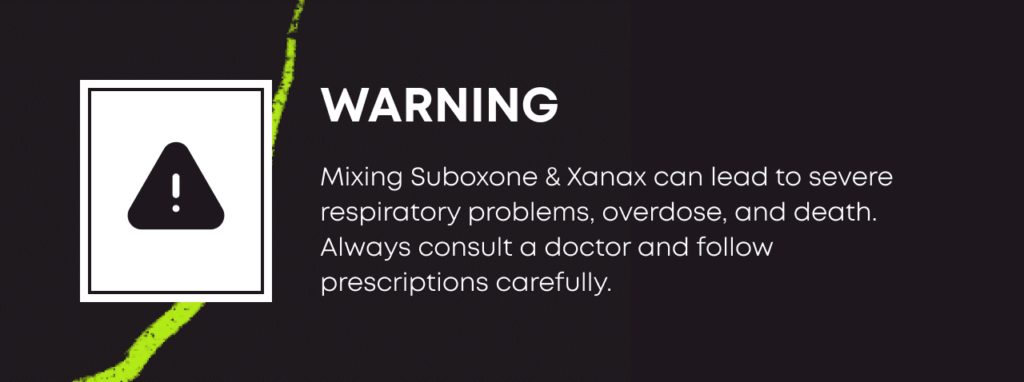There is a boxed warning about medication interactions with Suboxone, and Xanax is one of the medications that should not be taken at the same time without medical supervision. [1]
This is because Suboxone, a partial opioid agonist, and Xanax, a benzodiazepine, are both central nervous system (CNS) depressants, and mixing these two drugs can result in severe respiratory depression, overdose, and death.
Mixing Suboxone and Xanax, especially in an attempt to get high or overcome the ceiling effect of Suboxone, can have harmful and even life-threatening consequences. Never take these two medications together unless directed by a doctor. And even then, make sure you use caution.[2]

Dangers & Risks of Mixing Xanax & Suboxone
Mixing opioids like Suboxone with benzodiazepines such as Xanax can increase the risk of a fatal overdose. In 2021, approximately 14% of opioid overdose deaths involved benzodiazepines.[2]
Both of these medications suppress breathing and cause sedation (the main cause of fatal overdose). Moreover, both impair your ability to think clearly and make rational decisions.[3]
When mixed, Suboxone and Xanax can interact to cause the following:[3]
- Severe drowsiness
- Breathing problems (respiratory depression)
- Decreased awareness
- Coma
- Death
Both benzodiazepines and opioid medications are also habit-forming, leading to:[3]
- Tolerance
- Physiological dependence and potentially dangerous withdrawal symptoms, such as seizures
- Opioid use disorder and/or sedative-hypnotic anxiolytic use disorder
Xanax (alprazolam) is prescribed for the short-term relief of anxiety and panic disorders.[4] Withdrawal from benzos can be potentially life-threatening if the medication is stopped suddenly after physical dependence has formed.[4]
If you are already taking Suboxone for opioid use disorder or Xanax for anxiety and may need to take them together, you should talk to your doctor so you can understand the risks and benefits and proceed with caution.
Can You Take Xanax with Suboxone?
If you have opioid use disorder (OUD) and co-occurring anxiety disorder or panic disorder, in rare cases, your physician may prescribe you both Xanax and Suboxone, after weighing the risks and benefits. And if they do, they will likely prescribe the Xanax on a short-term basis—such as after a traumatic event or to deal with acute panic associated with flying.
However, if you have a separate Suboxone doctor and a doctor who prescribed Xanax, you need to inform both of them of all the medications you’ve been prescribed. They may decide not to prescribe both Xanax and Suboxone due to potential interactions and dangers.
Xanax is a benzodiazepine and a central nervous system (CNS) depressant that effectively manages symptoms of panic and anxiety. It’s not an opioid and therefore, Suboxone does not block its effects. Because both medications are CNS depressants, taking Xanax with Suboxone can increase the risk of respiratory depression and overdose.
If you are prescribed Suboxone and Xanax, you need to follow your provider’s instructions carefully to ensure your safety and minimize the risk of adverse effects. And never, under any circumstances, should you combine Xanax and Suboxone without prescriptions or against medical advice.
Alternatives to Xanax for Anxiety and Panic Disorder
Suboxone is a Medication for Addiction Treatment (MAT) for the management of opioid use disorder (OUD). It can help to reduce cravings for opioid drugs, minimize the odds of relapse, and help to manage opioid withdrawal symptoms.
One of the symptoms of opioid withdrawal can be anxiety, and anxiety disorders commonly co-occur with opioid addiction. Xanax is commonly prescribed to help manage anxiety, but if you are taking Suboxone, this may not be a safe option for you.
There are alternatives to benzodiazepines, like antidepressants, that do not cause the same level of sedation and breathing suppression. There are also other anxiolytic medications that may be less risky, such as hydroxyzine, or Buspar.
Holistic Treatment Methods for Anxiety
In addition to medications for the treatment of anxiety, behavioral therapies and counseling can help treat anxiety. Holistic interventions can also be beneficial in managing anxiety while taking Suboxone. These may include: [5]
- Exercise
- Massage therapy
- Mindfulness meditation
- Yoga
Talk to your doctor about your options. If you are using Suboxone as part of a comprehensive MAT program, your treatment team will be able to help you manage anxiety and other issues in a safe way while taking Suboxone.

Reviewed By Peter Manza, PhD
Peter Manza, PhD received his BA in Psychology and Biology from the University of Rochester and his PhD in Integrative Neuroscience at Stony Brook University. He is currently working as a research scientist in Washington, DC. His research focuses on the role ... Read More
- Suboxone. Indivior, PLC. https://www.suboxone.com/. 2022. Accessed September 2022.
- Benzodiazepines and Opioids. National Institute on Drug Abuse. https://nida.nih.gov/research-topics/opioids/benzodiazepines-opioids. April 2022. Accessed September 2022.
- American Psychiatric Association. (2013). Diagnostic and statistical manual of mental disorders (5th ed.). https://doi.org/10.1176/appi.books.9780890425596
- Xanax. Viatrus, Inc. https://www.xanax.com/. 2022. Accessed September 2022.
- What holistic therapies and practices help with anxiety and depression? (no date) Taking Charge of Your Health & Wellbeing. Available at: https://www.takingcharge.csh.umn.edu/what-holistic-therapies-and-practices-help-anxiety-and-depression (Accessed: 20 June 2023).
Download Our Free Program Guide
Learn about our program, its effectiveness and what to expect
Related Content
Imagine what’s possible on the other side of opioid use disorder.
Our science-backed approach boasts 95% of patients reporting no withdrawal symptoms at 7 days. We can help you achieve easier days and a happier future.